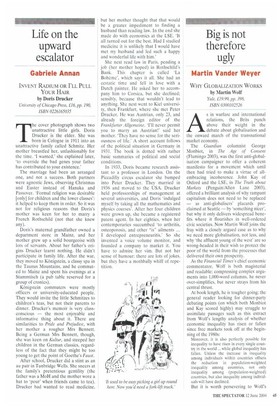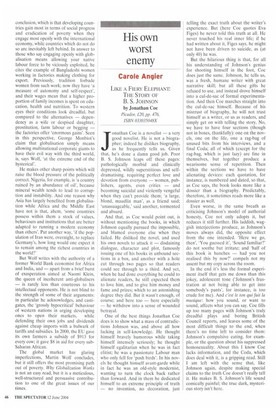Big is not therefore ugly
Martin Vander Weyer
WHY GLOBALIZATION WORKS by Martin Wolf Yale, £19.99, pp. 398, ISBN 0300102526 As in warfare and international relations, the Brits punch above their weight in the debate about globalisation and the onward march of the transnational market economy.
The Guardian columnist George Monbiot, in The Age of Consent (Flamingo 2003), was the first anti-globalisation campaigner to offer a coherent manifesto for a movement which until then had tried to make a virtue of allembracing incoherence. John Kay of Oxford and the LSE, in The TnIth about Markets (Penguin/Allen Lane 2003), offered a brilliant analysis of why rampant capitalism does not need to be replaced — as anti-globalisers' placards proclaimed at Seattle — by 'something nicer', but why it only delivers widespread benefits where it flourishes in well-ordered civic societies. Now Martin Wolf joins the fray with a closely argued case as to why we need more globalisation, not less, and why 'the affluent young of the west' are so wrong-headed in their wish to protect the poor of the world from the processes that delivered their own prosperity.
As the Financial Times's chief economic commentator, Wolf is both magisterial and readable: compressing complex arguments into 1,000-word columns, he never over-simplifies, but never strays from his central thrust.
At book length, he is tougher going; the general reader looking for dinner-party debating points (on which both Monbiot and Kay scored highly) may struggle to assimilate passages such as this extract from Wolf's lengthy analysis of whether economic inequality has risen or fallen since free markets took off at the beginning of the 1980s:
Moreover, it is also perfectly possible for inequality to have risen in every single country in the world ... while global inequality has fallen. Unless the increase in inequality among individuals within countries offsets the reduction in population-weighted inequality among countries, not only inequality among (population-weighted) countries, but also inequality among individuals will have declined.
But it is worth persevering to Wolfs
conclusion, which is that developing countries gain most in terms of social progress and eradication of poverty when they engage most openly with the international economy, while countries which do not do so are inevitably left behind. In answer to those who say engaging openly with globalisation means allowing your native labour force to be viciously exploited, he cites the example of Bangladeshi women working in factories making clothing for export. Previously, tradition forbade women from such work; now they have 'a measure of autonomy and self-respect', and their wages mean that a higher proportion of family incomes is spent on education, health and nutrition. To western eyes their conditions look dreadful, but compared to the alternatives — dependency as a wife or despised daughter, prostitution, farm labour or begging — the factories offer 'enormous gains'. Seen in this perspective, George Monbiot's claim that globalisation simply means allowing multinational corporate giants to have their evil way with the third world, is, says Wolf, 'at the extreme end of the hysterical'.
He makes other sharp points which will raise the blood pressure of the politically correct. Nigeria, for example, is 'a country ruined by an abundance of oil', because mineral wealth tends to lead to corruption and instability. And one reason why Asia has largely benefited from globalisation while Africa and the Middle Fast have not is that, ahem, 'some countries possess within them a stock of values, behaviours and institutions that are better adapted to running a modern economy than others'. Put another way, 'if the population of Iran were, overnight, to replace Germany's, how long would one expect it to remain among the richest countries in the world?'
But Wolf writes with the authority of a former World Bank economist for Africa and India, and — apart from a brief burst of exasperation aimed at Naomi Klein, the queen of incoherent anti-globalisers — is rarely less than courteous to his intellectual opponents. He is not blind to the strength of some of their arguments: in particular he acknowledges, and castigates, the 'grossly hypocritical' behaviour of western nations in urging developing ones to open their markets, while defending their own jobs and dividends against cheap imports with a bulwark of tariffs and subsidies. In 2000, the EU gave its own farmers a subsidy of $913 for every cow; it gave $8 in aid for every subSaharan African.
The global market has glaring imperfections, Martin Wolf concludes, but it still offers the most promising path out of poverty. Why Globalization Works is not an easy read, but it is a meticulous, well-structured and persuasive contribution to one of the great issues of our times.



















































































 Previous page
Previous page